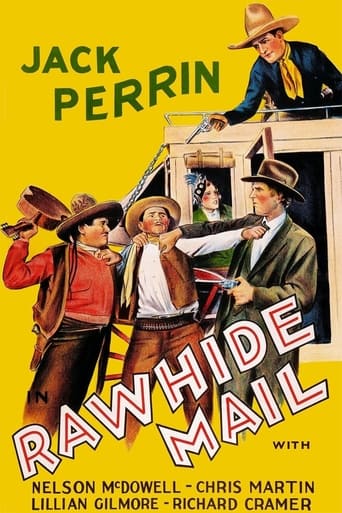Leslie Howard Adams
Which could have been said by "Rawhide Mail"'s associate producer Harry S. Webb to writer Bennett Cohen, as the pair dusted this one off in 1940 and remade it as "Pioneer Days", with Jack Randall replacing the original's Jack Perrin. By 1940, Jack Perrin was playing henchmen and bit roles in many of the films Harry S. Webb made at Metropolitan (with Bob Steele) and Monogram (with Jack Randall) and was in a couple of the Monogram/Webb/Randall films, but didn't suffer the indignity of doing an uncredited part in a remake of a film he had originally starred in.But others from the original-source film also appeared in the remake, although Nelson McDowell was the only one who played the same role in "Pioneer Days" as he had in "Rawhide Mail." And every bit as annoying in the remake as he is in "Rawhide Mail." Jimmy Aubrey and Robert Walker were both back, which is no surprise since both had worked in nearly every film Harry S. Webb was associated with from 1930-1941; Lafe McKee appeared in a lesser role ,as did Richard/Dick Cramer who was now an uncredited bartender but had been the lead villain in "Rawhide Mail." Fame fleeted fast in the world of B-westerns.Starlight the Wonder Horse,who was credited in more movies during the 1925-37 period then any other screen hoss, including Ken Maynard's "Tarzan", was now, alive or dead, grazing in greener pastures, so "Pioneer Days" star Jack Randall was riding a different horse. Really different, since his steed in the previous eight films for Monogram, was Rusty the Wonder Horse, but the producer for those was Robert Emmett Tansey and he had been replaced by Harry S. Webb for the concluding seven films in the Randall series. Evidently, Rusty the Wonder Horse, was working under an exclusive contract to producer Tansey, who took Rusty along to be in the series he was producing starring Tom Keene. So Randall was now riding an uncredited brown-and-white pinto named Tex. Tex had fewer credited film roles than any other horse in movies, but his uncredited back was ridden by more different players than any horse in films;Jack Randall, Tim Holt, Bob Steele, Charles King, Iron Eyes Cody, John King, Raymond Hatton, Vester Pegg, Art Davis, Jack Ingram,Loretta Young, Evelyn Finley and Ona Munson. Tex was an-equal opportunity horse who didn't care who rode him, whether it was the star or villain, male or female. But later, Tex got a break,of sorts, when he was purchased by Jimmy Wakely, who rode him in that performer's first 12-starring films at Monogram. Of sorts is used because Wakley changed his name to "Lucky." And Wakely got himself a new horse in his 13th film , and gave Lucky away to the "Queen for a Day" radio program which gave him away to a contestant as a prize. It is unknown who rode Lucky after that.Well, it may be known to the people who rode him but not here."Rawhide Mail" was one of the best films Jack Perrin starred in at Reliable Pictures. Don't scoff if the only Jack Perrin/Reliable film you've seen is "Rawhide Mail." See the others first. But "Pioneer Days" is in the bottom tier of the westerns made by Jack Randall. That isn't because Harry Webb's limited-directing skills had declined any with the passing of six years; It is because some of Randalls' previous films had been directed by the likes of Robert North Bradbury, Spencer Gordon Bennett and Alan James."Rawhide Mail", as a title was close to being a misnomer; most of the plot centered around the acquisition of (honestly and dishonestly) and the operation of (honestly and dishonestly)two saloons. But it was a golden film for those who played barflies. Notice the term used was not "patron". The people who made and wrote western films referred to the role as a Barfly or Saloon Extra or Barroom Extra. Patrons can be found as café and night club extras watching Fred and Ginger dance.Usually sissy types.


